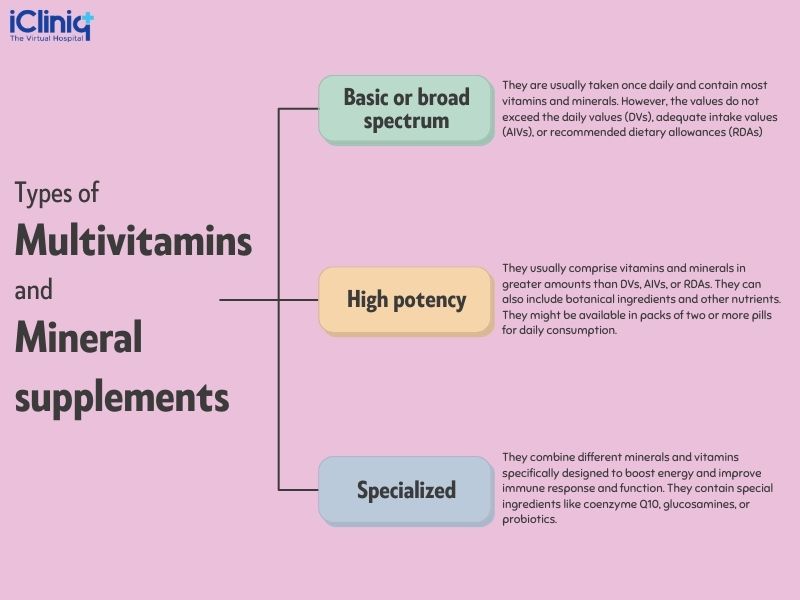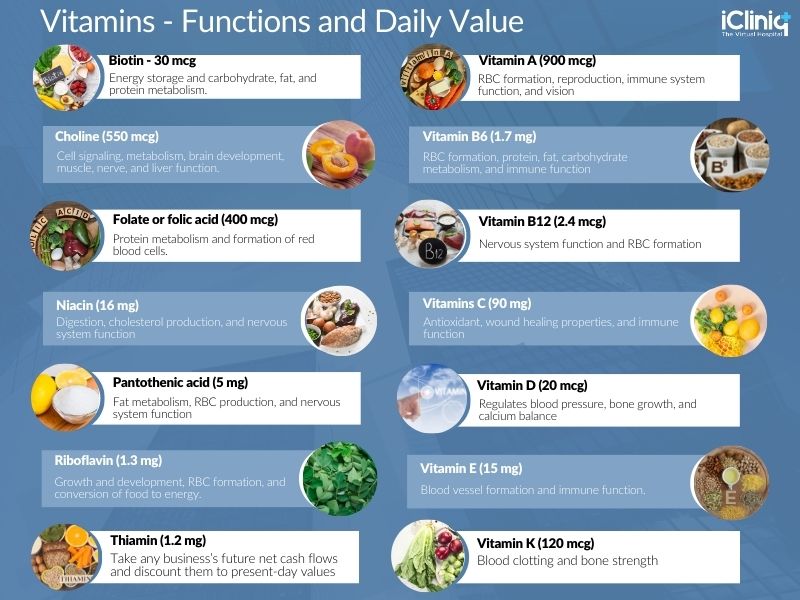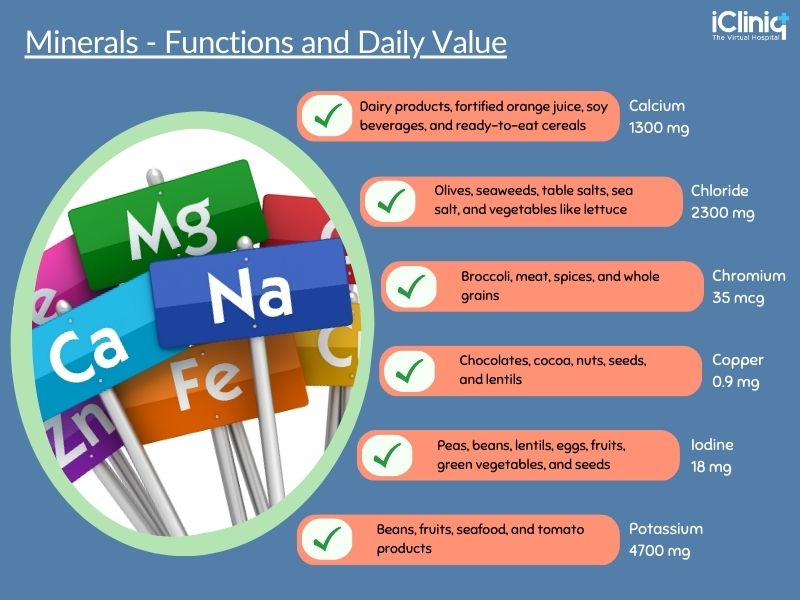Introduction:
Multivitamins and mineral supplements, broadly known as dietary supplements, are taken by innumerable people across the globe. They contain a combination of minerals, vitamins, and other ingredients that help improve the patient’s overall health, provide strength, and replenish the vitamins and minerals of the body. The human body contains several minerals and vitamins required for the overall functioning of the cells and tissues. Multivitamins and mineral supplements have gained popularity over the past few years because of the prevalent belief that they reduce the risk of chronic diseases and can compensate for malnutrition or poor eating habits.
One of the surveys conducted between 2011 to 2014 indicates that 52 % of adults take one or more dietary supplements daily, and 31 % take multivitamin supplements. However, studies conclude that healthy individuals must avoid taking supplements as they would not produce any impact on their health. Instead, they might increase the risk of chronic conditions like cancer. Hence, the patient must consult the doctor before consuming multivitamins and mineral supplements.
What Are Multivitamins and Mineral Supplements?
Multivitamins and mineral supplements are dietary supplements that are added to a person’s diet for nutritional benefits and to fulfill daily nutritional requirements. However, one must remember that multivitamins and mineral supplements must not be considered substitutes for fruits or meals that provide natural vitamins and minerals. The critical criterion for a substance to be classified as a supplement is that it should be ingestible and not injectable. This implies that if a particular substance has to be injected into the body, it cannot be considered a supplement. Multivitamins and mineral supplements are available as tablets, capsules, soft gels, liquids, and powders. Multivitamins are commonly referred to as multies, vitamins, or multiples. They are usually taken once or twice daily and are readily available online or at a local pharmacy store.
Insight Into the Safety of Multivitamins and Mineral Supplements Available in the Market:
Unlike other prescription drugs, the United States Food and Drug Administration (US FDA) does not have the right to approve or reject dietary supplements, including multivitamins and mineral supplements. However, as per the DSHEA (Dietary Supplement Health and Education Act), the FDA has the authority to ensure that the supplements sold in the market are beneficial to the person and not harmful. According to the DSHEA act, vitamins, minerals, herbs, or amino acids can be used as dietary supplements. In addition, the act grants power to the FDA to take strict actions against adulterated or unsafe supplements. The Center for Food Safety and Applied Nutrition (CFSAN) regulates the ingredients of dietary supplements.
What Are the Different Types of Multivitamins and Mineral Supplements?
There is no standard definition for multivitamins or mineral supplements and their constituents. Also, there are no specific values or the amount of nutrition that should be present in them. Therefore, the manufacturers decide to combine vitamins, minerals, and other nutrients. As per the National Institute of Health, multivitamins and mineral supplements (MVMs) can be classified as follows:

Who Should Take Multivitamins and Mineral Supplements?
Multivitamins and mineral supplements must be taken by only those who do not get sufficient minerals and vitamins from food, have reduced appetite, have a low-calorie diet, and are strict vegetarians or vegans. Sometimes, the doctor might recommend multivitamin supplements to the ones with chronic diseases. The following patients are likely to benefit after taking the multivitamins supplements:
-
Pregnant females taking 400 mcg of Folic acid daily from fortified foods or dietary supplements are more likely to have a healthy baby. Also, the risk of congenital defects of the spine and brain is less.
-
If a woman plans to conceive, prenatal supplements can provide her with the required nutrients, minerals, iron, and vitamin D during pregnancy. In addition to prenatal supplements, the doctor might also recommend other supplements containing chlorine and iodine.
-
Pregnant females who are vegetarian or have a vegan diet might be asked to consume supplements containing omega-3 fatty acids and vitamin B12.
-
Babies breastfeeding might also require vitamin B12 supplements if their mothers lack vitamin B12 or consume a vegan diet.
-
Breastfed babies and non-breastfed ones must receive equal vitamin D supplements that are 10 mcg per day.
-
People above 50 must consume dietary supplements or fortified foods to replenish their vitamin B12 levels. This is because their bodies might not be able to absorb vitamin B12.
What Are the Basic Nutritional Requirements of a Person?
One must choose foods rich in vitamins and minerals instead of supplements to fulfill daily nutritional requirements. Every individual requires different nutrients based on his body type, height, weight, sex, and physical activities performed by him. The nutrition facts label on the food packages can also help an individual evaluate his nutritional requirements. Sometimes the patient takes a dietary supplement to reach the daily recommended value of a particular nutrient in the diet. For example, lactose-intolerant people consume calcium supplements because it is difficult to drink milk or consume milk-containing products.
Multivitamins and minerals are integral to dietary supplements because they allow the body to function properly. Vitamins can be derived naturally from plants and animals or can also be obtained synthetically. Minerals are natural substances that can be obtained from soil and water or absorbed from plants. The body requires a large number of minerals, including calcium.
What Are the Different Vitamins and Minerals Present in Multivitamins and Mineral Supplements?
Vitamins and minerals play a crucial role in regulating the body's metabolic activities. The different types of vitamins are listed below:
-
Water Soluble Vitamins - They are usually excreted from the body rapidly and are not easily stored. Examples include vitamin B complex and vitamin C.
-
Fat-Soluble Vitamins - They are stored and transported from the body, similar to fat. Examples include vitamins A, D, E, and K.
The vitamins and their sources are described in the table below:

Minerals

What Is Vitamin and Mineral Deficiency?
Vitamins and minerals are the micronutrients required by the body in trace amounts. However, they have a huge impact on the body's overall health. Hence, the deficiency of one or more of these vitamins or minerals for prolonged periods can cause severe or life-threatening conditions. For example, pregnant females and children are more likely to suffer from vitamin A, iron, and iodine deficiency. In addition, developing countries are more likely to bear the burden of vitamin and mineral deficiency-related diseases. Vitamin and mineral deficiency not only cause dangerous medical conditions but also reduce the body's overall energy levels and capacity. As a result, the patient tends to have reduced work productivity, educational outcomes, and elevated risk of other medical conditions.
What Are the Signs and Symptoms of Vitamin and Mineral Deficiency?
Several benefits are associated with a well-balanced and nutritious diet. However, a diet that does not contain enough nutrients might cause numerous undesirable symptoms. Some signs and symptoms of vitamin and mineral deficiency are listed below:
-
The hair and nails become brittle and tend to fall.
-
Ulcers or cracks on the corner of the mouth.
-
Blurred vision at night.
-
White growths on the eyes.
-
Dandruff and scale-like patches on the scalp.
-
Hair loss.
-
The skin might have red or white bumps.
-
Restless leg syndrome (a neurological condition wherein the person has uncomfortable sensations in his legs).
What Are the Effects of Multivitamins and Mineral Supplements on Health?
Multivitamins and mineral supplements are required for multiple reasons. Some of the effects of multivitamins and mineral supplements are listed below:
-
Increases the Nutritional Intake of a Person - Studies report that multivitamins and mineral supplements increase a person's nutrient intake. In addition, these supplements help people derive the recommended amounts of vitamins and minerals they cannot obtain from their diet. For example, people with vitamin and mineral deficiency can take multivitamin supplements to increase their iron, vitamin A, zinc, niacin, and folic acid levels. However, some studies suggest that people who use multivitamins and mineral supplements tend to have a higher intake of these micronutrients from their diet than the ones who do not use supplements.
-
Improves Health - It has not been known whether supplements improve a person's health because different studies use different substances to compare the results. Several multivitamins and mineral supplements are available commercially, and the manufacturers change their composition as per their wishes. As a result, it is difficult for the researchers to determine their effects on the patient's health and chronic conditions. These supplements are mostly consumed by people having a healthy lifestyle and diet. As a result, no studies can be conducted to figure out the beneficial effects of these supplements. However, researchers have studied the effects of these supplements on patients with chronic diseases, including cancer, osteoporosis, lung cancer, and psychiatric disorders. According to the study results, multivitamins and mineral supplements do not significantly affect these conditions.
-
Cancer - Nothing has been known about whether multivitamins and mineral supplements affect cancer risk. Some researchers hypothesize that supplements reduce the risk of cancer, but no strong pieces of evidence are available to support this hypothesis. A large study conducted on men and women 60 to 65 years of age revealed that patients who take supplements for 3.5 years or more did not demonstrate any reduction in cancer risk except for the ones with lung cancer. Some researchers believe that supplements reduce the risk of colon cancer but elevate the risk of prostate cancer and leukemia in males.
-
Cardiac Diseases - Some experts hypothesize that supplements reduce the risk of cardiovascular diseases and other life-threatening conditions. This is because they contain specific nutrients that help regulate a person's blood pressure and vascular function. However, observational studies and placebo-controlled trials discovered that multivitamins and mineral supplements do not impact the risk of cardiovascular diseases.
-
Cataract and Age-Related Macular Degeneration - Multivitamin supplements can lower the risk of vision loss from age-related macular degeneration (AMD). As per the Age-Related Study Disease Report (ARSDR), people with AMD who consume supplements containing vitamin C, beta-carotene, vitamin E, copper, and zinc for more than six years have a lower risk of developing advanced AMD.
-
Pregnancy - Pregnant females must essentially consume prenatal supplements as they provide nutrients, including folic acid and iron. Studies also report that pregnant females on the verge of malnutrition and consuming supplements are less likely to have premature and low birth weight babies than those who do not consume them. However, supplements do not produce any changes if pregnant females consume a sufficient amount of vitamins and minerals from food.
What Precautions Should a Patient Take Before Taking Multivitamins and Mineral Supplements?
Before taking the supplements, the patient must inform the doctor if he is allergic to the supplement or any of its ingredients, including soy or peanuts found in certain brands. Some of these supplements also contain inactive ingredients, which can cause an allergic reaction or other problems. In addition, the patient must inform the doctor if he has a medical history of alcohol abuse, liver problems, and stomach or intestinal problems, including ulcers or colitis. For example, patients planning to take folic acid supplements must inform their doctor if they have pernicious anemia or vitamin B12 deficiency. This is because if pernicious anemia is left untreated for a long time, the patient might develop a serious nerve problem called peripheral neuropathy. Also, lactating mothers must remain careful as the supplements can pass into the breast milk.
Can Multivitamins and Mineral Supplements Be Harmful to the Patient?
People who consume a basic supplement are unlikely to observe any significant changes in their health. However, the ones who consume fortified drinks or foods such as cereals containing added vitamins and minerals or other dietary supplements must remain careful. One must observe the dose of vitamins and minerals supplements he consumes and ensure that it does not exceed the upper limit. Smokers must specifically avoid supplements containing vitamin A or beta-carotene because these ingredients elevate the risk of lung cancer. In addition, females consuming excess vitamin A during pregnancy are more likely to have babies with birth defects. However, this risk does not apply to women who consume beta-carotene.
What Are Some of the Side Effects of Multivitamins and Mineral Supplements?
The patient experiences different side effects based on the constituents of multivitamins and mineral supplements. Some of the side effects of multivitamins are listed below:
-
Constipation.
-
Diarrhea.
-
Stomach ache.
-
Allergic reaction.
-
Rashes.
-
Itching.
-
Swelling of the nose, face, and throat.
-
Dizziness.
-
Respiratory difficulties.
Healthy Diet and Supplements:
According to dietary guidelines, foods provide a wide variety of vitamins, minerals, and other nutrients. Hence, supplements should never be considered a substitute for food. These supplements should only be used when the patient cannot obtain sufficient vitamins and minerals from food. Hence, the patient must consult the doctor before taking multivitamins and mineral supplements because they can cause health hazards if consumed in excess.









